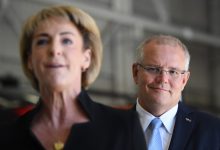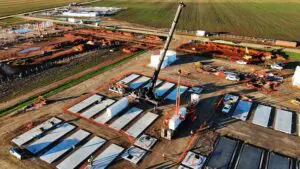When Labor strategists sat down a few weeks ago in front of a white board, “war-gaming” the potential response from the Coalition ahead of its soon-to-be-announced 50 per cent electric vehicle target, the last thing they expected was what they got.
Sure, they thought, maybe the Morrison government would have a crack at the potential price increases of petrol and diesel cars from the proposed new emissions standards – a reprise of the Murdoch carbon-tax-on-wheels scare campaign that caused the Coalition to go quiet with their own plans for EVs.
What Labor didn’t expect, even after six years of this Coalition government and its railing against climate policies, renewables and big batteries, was what Labor’s climate spokesman Mark Butler has described as the dumbest and loopiest campaign of them all against the future.
And it may turn out to be Scott Morrison’s “Prince Philip moment”, when it dawns upon the Australian public – like it did when Tony Abbott decided to knight his favourite duke – that the sitting prime minister, and his entire government, are so out of touch that it’s time to move on, or be moved.
The Morrison government’s extraordinary ill-informed attack on electric vehicles flies in the face of reality, and the future, in a way that can be seen far more clearly than its endless tilting at windmills and its predictions of an economy destroyed by modest renewable energy targets.
The decision by a number of developed economies to ban the sale of petrol and diesel cars, from as early as 2025, and by 2040 at the latest, and the decision by every car manufacturer to shovel virtually all their R&D dollars – tens of billions of dollars – into electric vehicles tells us where the future lies.
The big oil majors are snapping up charging technology companies wherever they can, and battery storage too. Even the likes of Shell think everything will be electric, or as near as dammit, by the early 2030s.
The Coalition was so absorbed by its own theatre it even forgot that its own weak emissions reduction policy prescribes a similar EV target to Labor’s. The only apparent difference between the two is that the Coalition’s is hidden, while Labor has actually thought about how that target can be reached, with planning and minimal cost and disruption.
More than anything, it points to how the Coalition lives in a tight conservative bubble. Anyone who watched and cringed at the performance of Liberal vice president Teena McQueen on ABC’s Q&A program a few weeks ago will recognise the signs.
McQueen simply had no idea that people thought any differently. She, like the Coalition ministers attacking EVs, wake up to Murdoch papers every morning, listen to and watch Sky News and talk-back shock-jocks all day and night, and repeat the dose every day. They actually believe the rubbish that they are fed.
It is no coincidence that it was Sky News commentators that led the attack against the EV policy, with talking heads saying it would be better to walk to Dubbo than drive an EV, and claiming charging them en masse would cause the lights to go out, a suggestion rubbished by experts.
Energy minister Angus Taylor quickly fell into line, initiating the “tradie” and Hilux scare that Morrison and a host of other ministers ran with for the next week as the arguments got sillier and sillier.
This was a car crash of a campaign, but it was no accident: This Coalition has been led by the nose by anti-science, anti-fact right wing ideologues in the Murdoch media, and within their own party, from before they were elected. On Sky News on Wednesday, the ticker tape was still proclaiming “Labor to ban the ute.”
The question for the upcoming election is how many others believe this nonsense.
In some ways, this should be a gift for Labor. It has struggled for traction with climate and energy policies – not because the public doesn’t agree with them, but because it has been easier for the Coalition to mount a believable scare campaign, even if they had to resort to threats of $100 roasts, the end of the sausage sizzle, economic ruin, and endless blackouts.
The response to the Coalition’s attack on FM radio has been derisory. The younger generation gets this new technology, even if the ageing white men and women in the conservative parties, and on Sky News, don’t.
But it’s one thing to attack wind turbines and solar panels and wonder what happens when the wind don’t blow and sun don’t shine, but the stuff about EVs does not pass the pub test. The public are laughing at their idiocy. Or they should be.
Australia used to have a car industry, but the Coalition killed it, quite deliberately. Some would like to see it revived, and Labor may attempt to do that, but the legacy is that it still has the smarts.
Numerous niche players are already emerging with their own manufacturing plans, from Michelle Nazzari and her electric scooters at Fonzarelli, the two-door cargo vehicles at ACE-EV in Brisbane, and the electric trucks and delivery vans adapted to conventional chassis by the highly successful SEA Electric in Victoria.
Sanjeev Gupta still has hopes of building electric vehicles in Australia, and as Mark Butler points out, research centres in Melbourne are helping Toyota and General Motors shift to electric platforms.
The biggest irony is that Australia leads the world in the technology that it has least of, at least in the developed world – and that is fast-chargers and very fast chargers.
The Brisbane based Tritium has carved out a global market share of around 20 per cent – beating even global heavyweights to the act, thanks to the ingenuity of a couple of local engineers. Fast City and others are following their lead.
Australians might not have embraced electric vehicles as rapidly as other countries, but that’s only because they have been starved of opportunities. Only the very well off have been able to afford the $100,000 plus ticket prices of the most alluring EVs, such as the Tesla Models S and X.
But Tesla is now a global brand and an internet phenomenon. People know what they are up to, and even though there are many questions about cost, range, and charging – both at home and on the road – the interest in EVs is there.
When The Driven posted its road test of the new electric Kona, a Hyundai-built SUV with a range of more than 450km, but still a hefty ticket price of $60,000, more than 50,000 people read it.
That interest is reflected in the slump in new car sales – it’s not just falling house prices and charging and range, it’s the mental note being made by many Australians that their next vehicle will be electric, and there’s not much point buying a new fossil fuel car now. They will just drive their existing car a little while longer, until the EV price comes down.
Morrison has now called the date for the next election – May 18. And he’s diving deeper into the EV mire: “People have decided they actually want to buy a car that can tow a boat, or their tinny, or a caravan or a trailer, or whatever they want,” he said on Thursday.
The Coalition began government six years ago with a scare campaign and a commitment to kill the carbon price and the renewable energy target. This month, its final orders from the fossil fuel lobby was to launch an even bigger scare campaign against Labor’s climate policies, give approval to the Adani coal mine, and call a poll on the day the CSIRO was due to be quizzed about that approval in Senate estimates.
Australians have never had a clearer choice between the past and the future. We’ve had a series of so-called climate polls, and we’ve seen the last five prime ministers – Malcolm Turnbull, Tony Abbott, Kevin Rudd, Julia Gillard and John Howard – fall victim to climate politics in one way or another.
Advocates are calling this yet another climate poll. But if the Coalition persists, perhaps this time it will be the EV election, or the Tesla poll. It would certainly make sense to see the denialist-in-chief kicked out of office by a fully charged electorate. And perhaps the next time a prime minister drives to Government House to call an election, it will be with an electric drive-train.
Note: You can find more news, analysis, and responses to FAQs about electric vehicles on our sister site, The Driven.








